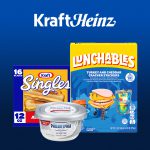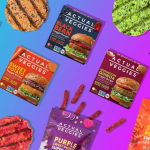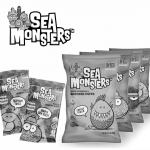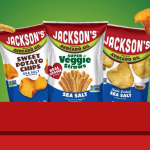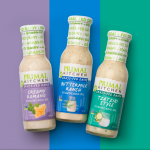Embracing the Art of Failure and Lessons from Entrepreneurs

About the Author: John Haugen is the Vice President and General Manager for 301 INC, the venture arm of General Mills. A 25-year veteran of General Mills, John has held a variety of leadership positions, focusing on marketing, general management and health & wellness strategy.
Babe Ruth once said, “never let the fear of striking out keep you from playing the game.” Entrepreneurs live by this. They are fearless. Rather than run from failure, they embrace it and make it part of their learning process.
As I looked forward to attending the Fancy Food Show in San Francisco this week I was reminded of everything I’ve learned over the past few years working with entrepreneurs at 301 INC, General Mills’ new business and venture unit.
It’s hard to encapsulate the energy, passion and creativity of these entrepreneurs into words, but I’m always looking to them to see what we can apply to the work we are doing in 301 INC and, more broadly, at General Mills. Here are a few lessons we’ve learned from our group of partners that I think can apply more broadly to the set of food and beverage entrepreneurs that continues to enter the market :
Lesson #1: Failure is a good thing.
It’s easy to forget that failing is a vital part of the learning and growing process. It may seem like new food businesses pop up overnight but, in reality, it typically takes an idea 5-7 years and multiple iterations to succeed.
Take Taylor Collins and Katie Forrest. Early in our journey we met this dynamic couple from Austin, TX. Taylor and Katie were endurance triathletes who had become vegetarian, then vegan. They developed a vegan snack bar, and consumed large amounts of soy and other highly processes proteins after workouts. But this put a lot of stress on their digestive systems and led to inflammatory ailments.
After much dietary trial and error, they started eating whole foods and healthy animal fats. Then they developed a 100% grass-fed meat bar that would become the foundation of a far more successful brand called Epic Provisions. In 2016, General Mills acquired the brand.
Taylor and Katie could have struck out, but they kept playing the game. Failing right takes time.
Lesson #2: Become irrationally obsessed with the consumer
Many entrepreneurs like Taylor and Katie founded start-ups simply because they had a personal problem to solve and wanted to help others like them. This creates an authentic story that resonates with consumers. Data-quanitified success is a mere afterthought.
Daniel Katz of “D’s Naturals” is another great example. At age 18, Daniel, or “D” as he is known, realized during his workouts that dairy-based protein bars were upsetting his stomach, and he didn’t like the other bars on the market because they were too heavy and sweet. So, with the help of some family members, he started making bars to his own specifications, containing more than 20 grams of protein, less than 250 calories, and 1 gram (or less) of sugar. He was so passionate about his product that he made persistent cold calls to sell in his product. He scrambled together a supply chain. D’s passion and drive to succeed resulted in countless nights spent in the office, with D opting for an air mattress on the office floor instead of at home.
One has to question D’s rationality. But he’s been able to establish a foothold for D’s No Cow Bar in just a few short years with national distribution.
Another example is Good Culture cottage cheese, which took a chance on a “flyover” category that may conjure images of the way my grandma used to make traditional curdy cheese with cling peaches. With some creative thinking, co-founder and CEO Jesse Merrill was able to rethink cottage cheese as a fresh gourmet dairy snack with a few simple ingredients that are rich in protein, cultures, and good fat, and low in sugars. It’s now fighting for share with other nascent cottage cheese brands and also targeting the multi-billion dollar Greek yogurt category.
Many of our entrepreneurs have this in common: they shatter the traditional ways we think about categories. They see in shades of consumer needs: protein, probiotics, and plant-based nutrition, rather than bars or cottage cheese.
They are obsessed with the consumer, sometimes at the expense of rational data and analytical spreadsheets. Because of it, start-ups like Good Culture are on the cusp of making cottage cheese on trend for, I’d argue, the first time in history.

Lesson #3: Speed is critical
Even though success can take a long time, entrepreneurs move fast. They are constantly re-assessing their landscape. Their urgency to look at new competitors, partners, and ways to drive growth is primal because they’re in survival mode.
Rhythm Superfoods, which makes products like kale chips and beet chips, has had to move faster than most because its products don’t clearly fit into the traditional grocery aisles. They live somewhere between snacks and vegetables. Rather than wait for consumers to pick them up among 40,000 other brands in the grocery store, Rhythm co-founder and CEO Scott Jensen activated quickly against two tactics. First, he went to the consumer, looking to sell his products in trend-forward places where he could break through with less clutter. Second, , he audaciously worked with competitors on an in-store display rack to grow awareness about the plant-based category as a whole, rather than specific products. This type of “out of the box” thinking is helping to reach consumers more quickly, instead of waiting for consumers to discover it in a highly cluttered environment.
At big companies, the behavioral tendency to solve problems and grow is to set up meetings to get everyone in “alignment.” Alignment takes time and energy. For entrepreneurs, it’s “let’s go,” even if it brings competitors next to each other on the shelf.
The 301 INC pivot
Having spent time a lot with entrepreneurs, we’ve developed a unique appreciation of “go time,” but perhaps the toughest and most valuable lesson for us at 301 INC has been embracing failure.
When we started 301 INC at General Mills five years ago as an in-house innovation unit, we attempted to emulate an entrepreneurial start up within the walls of the company, building new food ideas from the ground up. We created lots of things: a subscription snack delivery service, soup in K-cups, refrigerated pancake batter. Many of these awesome ideas struck out, and not for lack of trying. It was because we didn’t have the time and patience to fully build them.
So, we pivoted. We recognized our weaknesses and we learned from our failures. Two years ago, we looked outside ourselves and started investing in and helping scale early stage businesses. Not only are we providing capital, but we’re also connecting entrepreneurs to the strengths and resources that we have as a big company—decades of experience in supply chain operations, a stellar sales force, and deep knowledge in research and development.
These lessons have given us new perspective and empathy when working with entrepreneurs, and they fuel our passion for helping them grow. They’ve helped us evolve through our work with nine amazing entrepreneur partners.
We still have so much to learn, but I’m thankful for the inspiration and the lessons that our partners bring to us every day, and I hope their lessons might also be useful to you as you follow your own path.
At Project NOSH and BevNET, we pride ourselves on having a robust network of food and beverage entrepreneurs, industry insiders and advisers. NOSH Voices is a series of columns penned by respected experts to provide a spectrum of views from within the food community. Interested in contributing to NOSH Voices? Contact the Editors.
